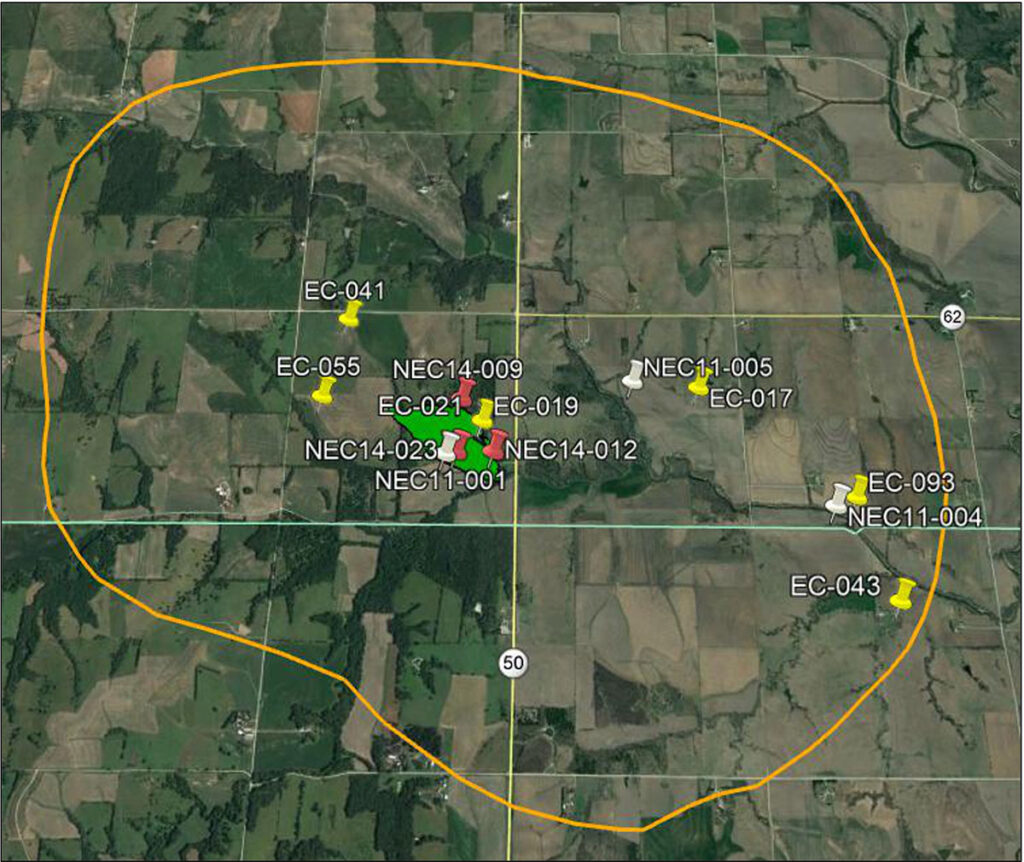CENTENNIAL, Colo. – March 2, 2021 – NioCorp Developments Ltd. (“NioCorp” or the “Company“) (TSX:NB) (OTCQX:NIOBF) is pleased to announce that it has launched a review of the economic potential of expanding its currently planned product suite from the Elk Creek Superalloy Materials Project (the “Project”) to also include rare earth products. NioCorp currently plans to produce niobium, scandium, and titanium at the Nebraska-based Project once project financing is secured and the Project is operational, and any rare earth products it might produce would be additional to its currently planned products.
The Company’s review of previously collected data on rare earth content in its Elk Creek Project comes in response to growing interest by governments and industrial consumers around the world for additional sources of rare earths beyond current suppliers. As noted in more detail below, additional test work is needed to establish a means of recovering and extracting rare earths into saleable products.
The Company has completed a comprehensive geologic and metallurgical evaluation of all of the rare earth data associated with the Project. Of the 20,364 assay results in the Elk Creek database, 13,287 (65%) contain a complete suite of analytical data for all commercial rare earth elements. Included within this dataset are 661 assays where the Total Rare Earth Oxide (“TREO”) assay results are greater than one percent. The table below outlines intervals of interest in particular drill holes.
NioCorp’s current plan to extract and purify niobium, scandium, and titanium from Elk Creek ore involves putting these critical minerals into solution. As part of that process, rare earth elements are simultaneously put into solution. Among the factors NioCorp will now consider is the economic potential for additional processing of the solubilized rare earths into commercial rare earth products.
NioCorp’s team is comprised of highly experienced professionals with a combined 70 years of experience in rare earth extraction, separation, and purification operations.
Detailed Drill Results
| Drill Hole | Azimuth (deg.) | Dip (deg.) | From (m) | To (m) | Interval (m) | TREO(%)1 |
|---|---|---|---|---|---|---|
| EC-017 | 0/360 | -90 | 548.6 | 579.1 | 30.5 | 1.96 |
| EC-019 | 0/360 | -90 | 187.5 | 237.7 | 50.3 | 1.07 |
| EC-021 | 300 | -60 | 207.6 | 228.6 | 21 | 1.58 |
| EC-041 | 238 | -70 | 356.6 | 381 | 24.4 | 2.22 |
| EC-043 | 0/360 | -90 | 237.7 | 254.5 | 16.8 | 2.69 |
| 295.7 | 323.1 | 27.4 | 1.82 | |||
| EC-055 | 295 | -60 | 246.9 | 271.3 | 24.4 | 1.74 |
| 298.7 | 323.1 | 24.4 | 1.17 | |||
| 338.3 | 390.1 | 51.8 | 1.58 | |||
| 149.4 | 298.7 | 149.4 | 2.77 | |||
| NEC11-001 | 30 | -70 | 836.4 | 843.9 | 7.6 | 1.17 |
| NEC11-004 | 90 | -55 | 213.3 | 315.2 | 101.9 | 2.75 |
| 333.7 | 376.3 | 42.7 | 2.94 | |||
| 391.6 | 421.7 | 30.1 | 1.39 | |||
| NEC11-005 | 100 | -70 | 235.8 | 247.6 | 11.8 | 1.48 |
| 331.9 | 348.4 | 16.5 | 2.07 | |||
| 472.9 | 521.2 | 48.3 | 1.41 | |||
| 528.4 | 575.4 | 47 | 1.41 | |||
| 602.4 | 612 | 9.6 | 1.71 | |||
| NEC14-009 | 208 | -70 | 251 | 260.5 | 9.5 | 1.04 |
| 293.3 | 301.8 | 8.6 | 1.41 | |||
| NEC14-012 | 300 | -68 | 220 | 246 | 26 | 1.07 |
| NEC14-022 | 30 | -68 | 832.9 | 855.8 | 22.9 | 1.19 |
| NEC14-023 | 30 | -71 | 340 | 347 | 7 | 1.51 |
1 TREO is the sum of the following REOs: La2O3, Ce2O3, Pr6O11, Nd2O3, Sm2O3, Eu2O3, Gd2O3, Tb2O3, Dy2O3, Ho2O3, Er2O3, Tm2O3, Yb2O3, Lu2O3. The measured length of each individual assay interval was used to calculate a weighted average for the noted intervals.
At the time each hole was completed, NioCorp had access to land via individual landowner agreements. As part of NioCorp’s future work, a revaluation of the land position will be completed.
The drilling results for the “EC” holes noted above pre-date NI 43-101 standards and were subjected to a Quality Assurance / Quality Control program consistent with industry best practices at the time. The remaining drilling results were subjected to a Quality Assurance / Quality Control program consistent with National Instrument 43-101 and industry best practice.
The assay intervals noted above do not constitute a Mineral Resource or a Mineral Reserve under any regulatory definition. Each drill hole is within the footprint of the 7,800-acre Elk Creek Carbonatite (which refers to the larger underground geological structure that has been defined by geophysics), depicted on the map below. The drill holes outside the green Nb2O5 grade shell would help guide the planning for future exploration in the area of the Elk Creek Carbonatite.

Elk Creek Carbonatite outline (orange) along with 0.3% Nb2O5 grade shell outline (green) and drill holes with notable Rare Earth Oxide Intervals. Johnson and Pawnee Counties, Nebraska, USA
As part of the Company’s pilot-scale metallurgical development program that was conducted from 2015 – 2017 at SGS-Lakefield in Lakefield, Ontario, Canada, a representative bulk sample of the company’s Mineral Resource was assembled from drill core stored at the Company’s operations base near Elk Creek, Nebraska. The focus of the pilot testing was the recovery of the niobium, scandium and titanium in the Elk Creek ore into products meeting commercial specifications. This program and previous technical evaluations of the ore included mineralogical assessments, which demonstrated that the rare earths in the ore are hosted in carbonate minerals (bastnasite, parasite, & synchysite) along with a phosphate mineral (monazite).
While this work was being conducted, evaluations of the metallurgical extraction of the rare earths were conducted in parallel. In particular, the extraction of the rare earths in the primary hydrochloric acid leach circuit was assessed. The table below details the rare earth oxide (“REO”) assays for the bulk ore sample, along with the extraction of each REO to solution in the hydrochloric acid leach:
| Rare Earth Oxide |
Assay (ppm) |
MeasuredExtraction (%) |
|---|---|---|
| La2O3 | 872 | 71 |
| Ce2O3 | 1,476 | 70 |
| Pr6O11 | 164 | 70 |
| Nd2O3 | 586 | 71 |
| Sm2O3 | 188 | 73 |
| Eu2O3 | 83 | 74 |
| Gd2O3 | 219 | 76 |
| Tb2O3 | 23 | 71 |
| Dy2O3 | 100 | 71 |
| Ho2O3 | 14 | 70 |
| Er2O3 | 29 | 71 |
| Tm2O3 | 3 | 58 |
| Yb2O3 | 17 | 72 |
| Lu2O3 | 3 | 65 |
| LREO1 | 3,099 | |
| HREO2 | 680 | |
| TREO | 3,778 |
2 HREO (Heavy Rare Earth Oxide) is the sum of the following: Sm2O3, Eu2O3, Gd2O3, Tb2O3, Dy2O3, Ho2O3, Er2O3, Tm2O3, Yb2O3, Lu2O3
It should be noted that the assays for thulium (Tm) and lutetium (Lu) are low enough that the accurate measurement of extraction is more challenging than for the other rare earths. The extraction of scandium in this same test was 73%, mirroring the results for the rare earths. Based on the metallurgical testwork completed at SGS, the extraction of both the rare earths and scandium in the hydrochloric acid leach for the Elk Creek hydrometallurgical model was set at 73%. The hydrochloric acid leach dissolves the carbonate minerals, including those containing rare earths.
The subsequent process step in the Elk Creek process flowsheet is an acid bake, where the remaining ore is combined with sulphuric acid in a heated mixer for the purpose of extracting the scandium along with niobium and titanium. While rare earths were not assayed during the pilot testing of this unit operation, scandium extraction was measured at an additional increment of 25%. Scandium and the rare earths tend to behave in the same way chemically in such processes, and examination of the residue from the acid bake did not show detectable amounts of any rare earth phosphate minerals, and the concentrations of phosphorus were measured at part per billion levels, indicating a high extraction of any phosphate hosted rare earths.
Additional testwork is needed to establish a means of recovering and extracting rare earths into saleable products. The metallurgical results noted herein are based on the known chemical behavior of the rare earths, bench and pilot scale testwork at independent labs, the Feasibility-level design of the Elk Creek metallurgical process and the 70 years of rare earth metallurgical experience of the NioCorp technical team.
Mark Smith, CEO and Executive Chairman of NioCorp, said: “I am extremely pleased with the work that NioCorp’s technical team has completed to date on the rare earth potential of the Elk Creek Carbonatite. Based on these results, and in light of the market’s high interest in new sources of rare earths, I have directed our team to carefully re-assess the economic potential of the rare earths in our resource. We think this is logical, given that we are putting a significant quantity of rare earths into solution at zero additional cost to our current mining and processing plans.”
Scott Honan, NioCorp’s COO, said: “We expect to execute comprehensive work plans dedicated to examining the economic potential for production of rare earth products as part of the Elk Creek Project. This will include evaluating rare earth extractions in larger scale carbonation testing on the Elk Creek Project ore, which are currently underway.”
_______________________________
Qualified Persons: The following Qualified Persons as defined by National Instrument 43-101 have read and approved the technical information contained in this news release:
- Scott Honan, M.Sc., SME-RM, COO of NioCorp Developments Ltd., verified the data disclosed in this news release which includes a review of the assay, analytical and hydrometallurgical data underlying the information, and opinions contained herein.
- Trevor Mills, P.G., SME-RM, Senior Geologist and US Operations Manager, Dahrouge Geological Consulting USA Ltd. verified the data disclosed in this news release which includes a review of the assay data underlying the information and opinions contained herein.
- Eric Larochelle, B.Eng., Hydrometallurgy Specialist for L3 Process Development verified the data disclosed in this news release which includes a review of the analytical and hydrometallurgical data underlying the information and opinions contained herein.
@NioCorp $NB $NIOBF #ElkCreek #Niobium #Scandium #ElkCreek #Nebraska #rareearth
For More Information
Contact Jim Sims, VP of External Affairs, NioCorp Developments Ltd., 720-639-4650, [email protected]
About NioCorp
NioCorp is developing a superalloy materials project in Southeast Nebraska that will produce the critical minerals niobium, scandium, and titanium. Niobium is used to produce superalloys as well as High Strength, Low Alloy (“HSLA”) steel, which is a lighter, stronger steel used in automotive, structural, and pipeline applications. Scandium is a superalloy material that can be combined with aluminum to make alloys with increased strength and improved corrosion resistance. Scandium is also a critical component of advanced solid oxide fuel cells. Titanium is used in various superalloys and is a key component of pigments used in paper, paint and plastics and is also used for aerospace applications, armor and medical implants.
Forward-Looking Statements Disclaimers
Certain statements contained in this document may constitute forward-looking statements, including statements regarding the potential of economically producing rare earth products in addition to the company’s currently planned suite of products. Readers are cautioned that such forward-looking statements involve known and unknown risks, uncertainties and other factors that may cause a change in such assumptions and the actual outcomes and estimates to be materially different from those estimated or anticipated future results, achievements or position expressed or implied by those forward-looking statements. Risks, uncertainties and other factors that could cause NioCorp’s plans or prospects to change include risks related to the Company’s ability to operate as a going concern; risks related to the Company’s requirement of significant additional capital; changes in demand for and price of commodities (such as fuel and electricity) and currencies; changes in economic valuations of the Project, such as Net Present Value calculations, changes or disruptions in the securities markets; legislative, political or economic developments; the need to obtain permits and comply with laws and regulations and other regulatory requirements; the possibility that actual results of work may differ from projections/expectations or may not realize the perceived potential of NioCorp’s projects; risks of accidents, equipment breakdowns and labor disputes or other unanticipated difficulties or interruptions; the possibility of cost overruns or unanticipated expenses in development programs; operating or technical difficulties in connection with exploration, mining or development activities; the speculative nature of mineral exploration and development, including the risks of diminishing quantities of grades of reserves and resources; and the risks involved in the exploration, development and mining business and the risks set forth in the Company’s filings with Canadian securities regulators at www.sedar.com and the SEC at www.sec.gov. NioCorp disclaims any intention or obligation to update or revise any forward-looking statements whether as a result of new information, future events or otherwise.

